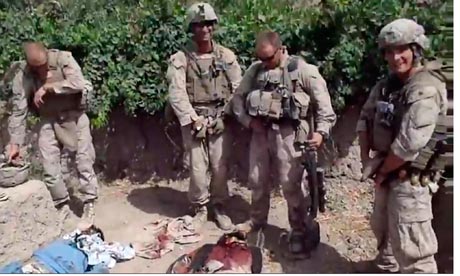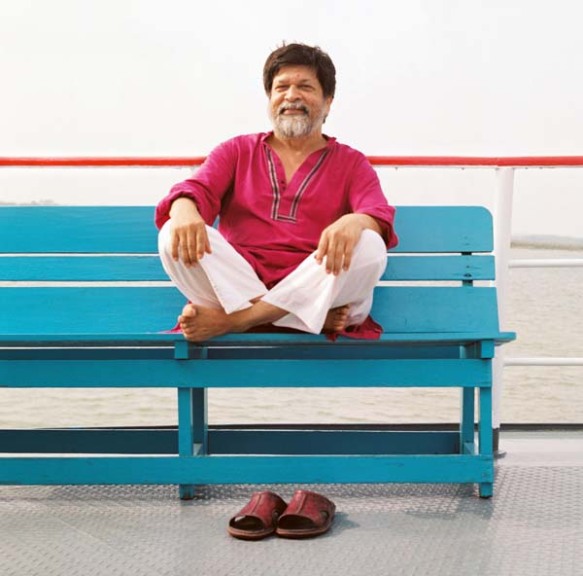The Bangladeshi War of Liberation, like all other wars, has a contested history. The number killed, the number raped, the number displaced, are all figures that change depending upon who tells the story.
But in our attempt to be on the ?right side? of history, we often forget those who ended up on the wrong side. Those who have gone, those who were permanently scarred, mentally, physically, socially, don?t really care about our statistics. The eyes that stare into empty space, knowing not what they are searching, the frail legs, numbed by fatigue, drained by exhaustion, yet willed on by desperation, the wrinkled hands, seeking a familiar touch, a momentary shelter, longing for rest, do not care about the realpolitik of posturing superpowers.
Category: Photojournalism issues
Art as a Witness
Shahidul Alam to speak at the Colombo Art Biennial : Art as a Witness
An extraordinary artist ? eloquent with words and images ? Shahidul Alam is a photographer, writer, activist and social entrepreneur, who was profoundly influenced by inequality in Bangladesh, his country and the liberation war. He left a career in science in the west to pursue a life in photography challenging oppression and imperialism in all its forms. Attacked, arrested, and threatened with death, Alam has built what many consider to be the finest photography school in the world, an award winning agency, and the world?s most demographically diverse photo festival. Widely celebrated, Alam claims as his achievements not the awards he has won or the impressive list of exhibits, but the people he has trained and the lives he has transformed. Continue reading “Art as a Witness”
If It Bleeds
“Weegee: Murder Is My Business” Through September 2.?International?Center of Photography, New York.
Weegee’s photographs are as much about Weegee as they are about crime.
By James Polchin

Weegee strikes again
Body of Dominick Didato, Elizabeth Street, New York, August 7, 1936.
In the fall of 1978, the International Center of Photography mounted the first retrospective of Weegee photographs. Reviews of the show were positive, though the reviews often centered on debates about the artfulness of Weegee?s tabloid images. The?New York Times?critic began with the very conundrum of this tension between art and news photography: ?It is always faintly alarming to see the photographs of Weegee on exhibition at a museum or gallery. They were not made for exhibition but to be reproduced in tabloid newspapers.? Despite this beginning, the review affirms Weegee?s importance in American photography, and argues that his work influenced later artists such as Diane Arbus and Garry Winograd. Continue reading “If It Bleeds”
Eduardo Santiago's Reviews > Shahidul Alam: My Journey as a Witness
by?Shahidul Alam,?Rosa Maria Falvo?(Editor)

Recommended to Eduardo by:?Ginger
Painful to read. Troubling… but beautiful and inspiring as well. Alam comes across as deeply bitter, but unlike the rest of us he uses that to make this world a better place. Through his photography, his words, his actions, he brings truths to light. Beauty, too.
This is not a coffee table book. It’s not even mostly a photography book. It’s … autobiography? Geopolitical venting? Self-congratulation? Those but also much more. From my privileged first-world position it’s difficult to understand this book in context, to know where Alam is coming from. It’s easy to accept his perspective, to be temporarily outraged, and ultimately to do nothing because the third world (?Majority World?, as Alam insightfully calls it) is so remote.
Despite that, despite Alam’s occasionally difficult prose, I think this is a book worth reading and absorbing. A perspective that may be new to many of us. A reminder of so much that still needs to be fixed in this world, and that there are people fighting to fix it.
What really links the 'urinating marines' video with Abu Ghraib
In the digital age, people document and share everything ? even insults to the fallen

My journey as a witness on National Geographic website
Subscribe to ShahidulNews
About the book
This book showcases Shahidul Alam?s photographs, more than 100 color and black and white plates illustrating the journey of an artistic, social, and political witness from inside Bangladesh. This groundbreaking work retraces his personal vision spanning three decades and provides the best interpretative and investigative angles into a culture and reality that is otherwise often misunderstood in the West. Using photography and journalism as its parameters, it is the first comprehensive vision of Bangladesh. These images are not ?about? the region from a European perspective, nor are they an ethnographic account of an ex-colonial world. Instead, this volume is an ?on-the-ground? insight, exploring its topography with decidedly competent indigenous eyes. A personal ?way of seeing? ? the journey of a witness ? this book offers a reflective picturing of national and geographical truths, where the ?other? is no longer a stranger. Alam provides a purposeful alternative to the media driven images of poverty and destruction, literally defying received notions of the Subcontinent. After many years of struggle, he is a pioneering catalyst, inspiring development from within his ?majority world?; founding an artistic movement that cannot be silenced: the emergence of local photographers, achieving an intimacy with their subjects that truly understands and so rivals Western perceptions.
Alam?s image making carries its editorial eloquence far beyond its subject matter. For over 30 years, he has led the way in developing photography as a discipline in Bangladesh, producing an entirely new generation of acclaimed artists in the international arena. His writing style is personal, sometimes fast paced, often reflective, with magnificent imagery interwoven throughout the narrative.
Purchase?My Journey as a Witness here
About the author
Shahidul Alam is a photographer, writer, curator and activist. He obtained a PhD in chemistry at London University before switching to photography. He returned to his hometown Dhaka in 1984, where he photographed the democratic struggle to remove General Ershad. A former president of the Bangladesh Photographic Society, Alam set up the award winning Drik Agency, the Bangladesh Photographic Institute, and Pathshala, the South Asian Institute of Photography; considered one of the finest schools of photography in the world. Director of the Chobi Mela International Photo Festival and chairman of Majority World Agency, Alam?s work has been exhibited in galleries such as?MOMA in New York, the Centre Georges Pompidou in Paris, the Royal Albert Hall in London and The Museum of Contemporary Arts in Tehran. A guest curator of the National Art Gallery in Malaysia and the Brussels Biennale, Alam?s numerous photographic awards include the Mother Jones and the Andrea Frank Awards. He has been a jury member in prestigious international contests, including World Press Photo, which he chaired. An Honourary Fellow of the Bangladesh Photographic Society and the Royal Photographic Society, Alam is a visiting professor of Sunderland University in the UK and principal of the South Asian Media Academy in Dhaka, Bangladesh. A prominent social activist Shahidul Alam is also a promoter of new media and has lectured and published widely on photography, new media and education, in the?USA, Europe, Africa, Asia, Australia and Latin America.
Pop Tech 2011 interview
Subscribe to ShahidulNews
Shahidul Alam on photography for change

Shahidul Alam walked on stage on Thursday wearing a marigold-colored salwar kameez, a camera over his left shoulder, and a beltpack slung around his hips. There was no mistaking his calling. The Bangladeshi photographer, activist and social entrepreneur has almost single-handedly rebalanced the world of photojournalism, long dominated by Western photographers and their worldview. He has shifted its lens eastward and southward by training legions of photographers in his homeland, creating an award-winning photo agency to sell their work and founding a prestigious international photography festival to showcase their talent. And this fall, he published a book,?My Journey as a Witness, telling the story of Bangladeshi photography as an instrument of social justice. He serves as an ambassador of this movement, in the words of PopTech?s executive director, Andrew Zolli, ?travelling the world leaving new cultures of art makers in his wake.? We sat down with Alam backstage in Camden, Maine. Continue reading “Pop Tech 2011 interview”
Pop Tech
Photographer Sheds Light On Bangladesh
Subscribe to ShahidulNews
![]()
Listen to the audio
![]()
Morning Edition [7 min 19 sec]
November 14, 2011
Steve Inskeep talks to Shahidul Alam, a former chemist who became a photographer because he was tired of seeing images of the developing world through the lens of Western photographers. He now runs an art gallery, a photo agency and a school of photojournalism in Bangladesh. He recently published a book of stunning photographs called My Journey as a Witness.
——————————————
Transcript:
STEVE INSKEEP, host: Twenty years ago, a cyclone devastated Bangladesh, and the photographer Shahidul Alam says he received a request for news photos from The New York Times. Mr. Alam says he argued successfully for different kinds of images to make the paper.
SHAHIDUL ALAM: They wanted bodies. They wanted destruction. They wanted to show the horror of the cyclone which was important, of course. But what is also important was the fact that people were rallying around to support each other; that farmers were replanting their seeds; that fishermen were going out into the sea; that human beings were trying to rebuild their lives.
INSKEEP: Alam says he wants to give the world a fuller image of poor countries like his. His new book of photos, called “My Journey as a Witness,” does not flinch from Bangladesh’s many problems. But his photos also seek to show the rich colors, the expressive faces, the very human lives of crowded places like the mega-city of Dhaka.
Continue reading “Photographer Sheds Light On Bangladesh”
BBC World The Strand Podcast
Subscribe to ShahidulNews
MEDIA :
AVAILABILITY:
Available to listen.
Last broadcast?yesterday,?22:32?on?BBC World Service?(see?all broadcasts).
NEXT ON:
Today,?03:32?on?BBC World Service





